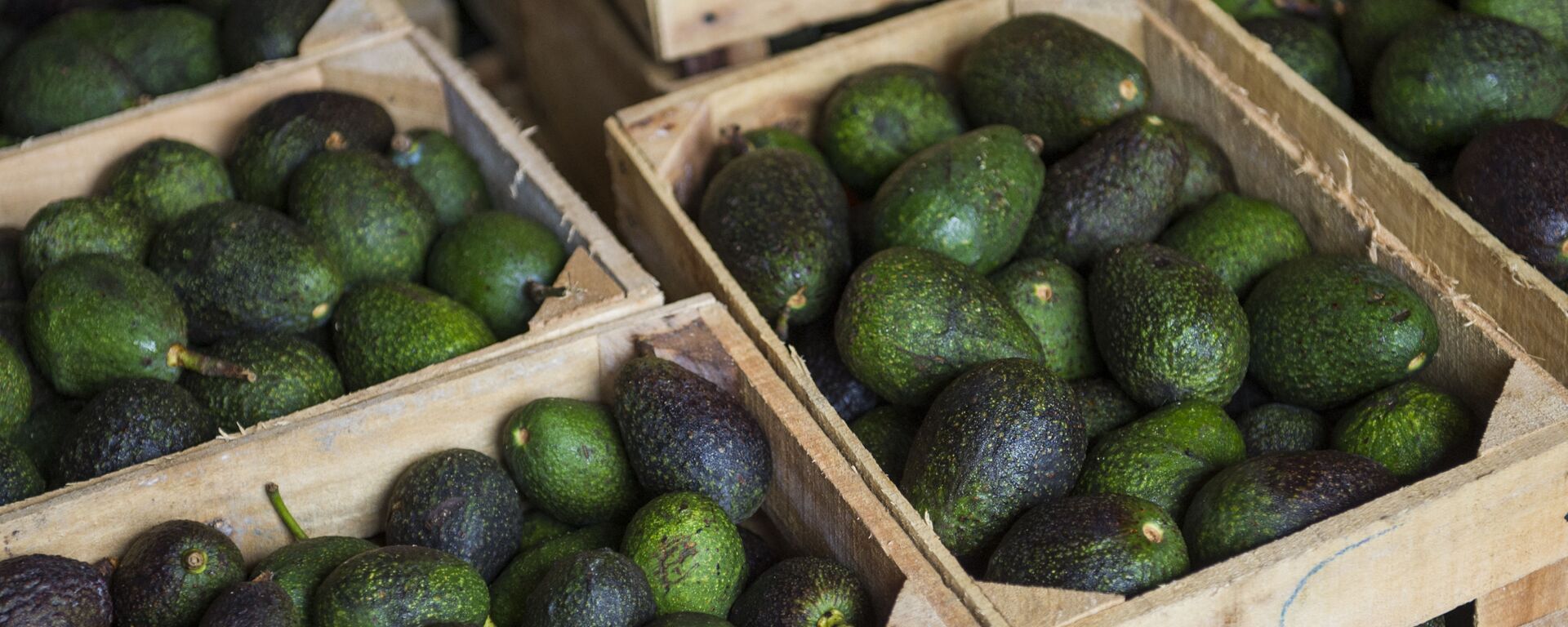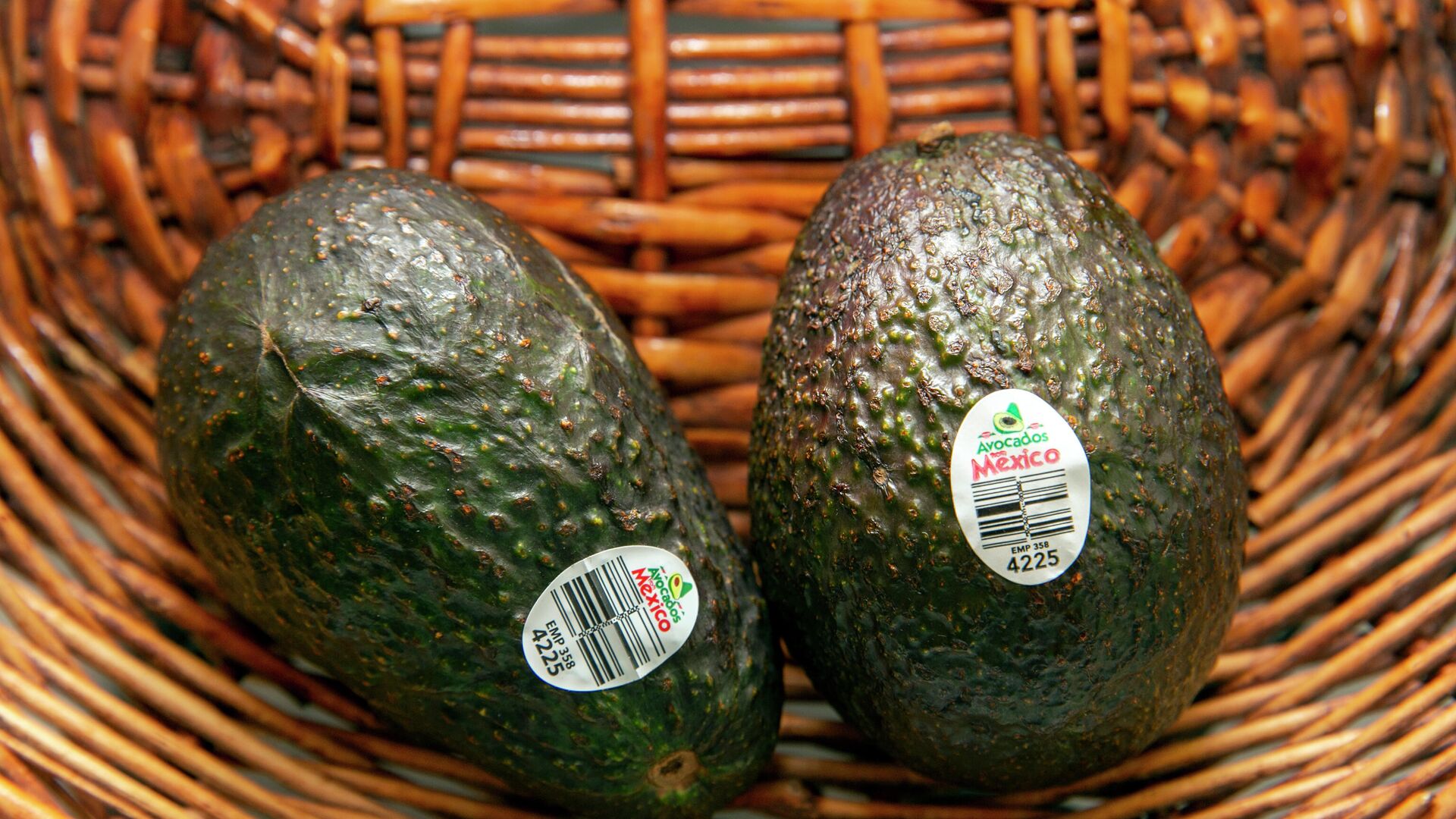https://sputnikglobe.com/20220225/avocados-held-hostage-by-drug-violence-in-mexican-state-of-michoacan-1093377047.html
Avocados Held Hostage by Drug Violence in Mexican State of Michoacan
Avocados Held Hostage by Drug Violence in Mexican State of Michoacan
Sputnik International
Although the United States Department of Agriculture resumed imports of avocados after a nearly week-long ban, Mexico’s western state of Michoacan is being... 25.02.2022, Sputnik International
2022-02-25T20:54+0000
2022-02-25T20:54+0000
2022-08-06T11:11+0000
avocado
crime
us
drug gangs
mexico
https://cdn1.img.sputnikglobe.com/img/07e6/02/19/1093377228_0:160:3073:1888_1920x0_80_0_0_fc91dd9cc140a7b3b56c27113d2f3e11.jpg
Mexico’s production of avocados is heavily concentrated in the state of Michoacan, where they are responsible for growing 92% of the country’s avocados, according to a 2010 USDA Foreign Agricultural Service report. The fruit, termed “green gold,” fetches a hefty profit for the country. In 2021, avocado sales to the U.S. grossed $2.8 billion in sales which benefited Mexico.But the battle over the agricultural heartland is raging, as soldiers work to deactivate makeshift landmines left by drug traffickers who want a share of the fruit’s capital.Nemesio “El Mencho” Oseguera is the name on everyone’s list. Oseguera, who is 55, is head of the Jalisco New Generation Cartel and has a $10 million bounty on his head as one of the United States’ most wanted fugitives.Oseguera’s cartel is fighting with their rival, Los Viagras, over drug smuggling routes, as well as the beloved fruit, which is gobbled up by Americans who eat around 69 million pounds of avocados during Super Bowl Sunday. In 2019, Americans ate about 2.6 billion pounds of the delicious fruit.This year, on the eve of the Super Bowl, the U.S. suspended imports of the fruit following a threat made against a U.S. plant safety inspector.“We are working with the Mexican government to guarantee security conditions that would allow our personnel in Michoacan to resume operations,” the U.S. Embassy then wrote in response to the threat.The ban has since been lifted after Mexican authorities promised to strengthen safety measures for inspectors from the Department of Agriculture's Animal and Plant Health Inspection Service. But that doesn’t mean violence spurred by Mexican drug traffickers is letting up.Alex Horenstein, an economist and associate professor at the University of Miami, has said that any complications with Mexico’s production of the “green gold” could reward U.S. avocado farmers, who are only able to grow the fruit seasonally, while putting U.S. consumers in a bind.Before the threat against the inspector was made, Mexico’s army had already entered Aguililla, Michoacan’s capitol, without the use of force. The army has since then been patrolling towns in the state of Michoacan, which drug traffickers have left the marks of their efforts: bullet holes, barricades, around 250 makeshift landmines thus far, and graffiti with the cartel’s signature, “CJNG”.Drug-related violence in Michoacan resulted in roughly 2,700 murders in 2021 alone. Residents of Aguililla, who are hoping for peace while under serious threat from the drug cartels, have voiced the opinion that the army should stay.Last year, avocado farmers in Ario de Rosales formed an organization in self-defense in an effort to prevent kidnapping, extortion and theft posed by the cartels. Mexican President Andres Manuel Lopez Obrador has opposed such groups, labeling them “vigilantes.” His belief is that such groups can be easily infiltrated by criminals.Evangelina Contreras, 54, who used to be a resident of Michoacan until her daughter went missing, reportedly said the state is unrecognizable after two decades of crime. “You could walk freely and go out at night. Now you can’t,” she laments.
https://sputnikglobe.com/20220215/us-suspends-mexican-avocado-imports-after-official-receives-threatening-phone-call-1093037503.html
mexico
Sputnik International
feedback@sputniknews.com
+74956456601
MIA „Rosiya Segodnya“
2022
Mary Manley
https://cdn1.img.sputnikglobe.com/img/07e6/01/0b/1092187887_0:0:2048:2049_100x100_80_0_0_0c2cc4c84f89aff034cc55bb01fb6697.jpg
Mary Manley
https://cdn1.img.sputnikglobe.com/img/07e6/01/0b/1092187887_0:0:2048:2049_100x100_80_0_0_0c2cc4c84f89aff034cc55bb01fb6697.jpg
News
en_EN
Sputnik International
feedback@sputniknews.com
+74956456601
MIA „Rosiya Segodnya“
Sputnik International
feedback@sputniknews.com
+74956456601
MIA „Rosiya Segodnya“
Mary Manley
https://cdn1.img.sputnikglobe.com/img/07e6/01/0b/1092187887_0:0:2048:2049_100x100_80_0_0_0c2cc4c84f89aff034cc55bb01fb6697.jpg
avocado, crime, us, drug gangs, mexico
avocado, crime, us, drug gangs, mexico
Avocados Held Hostage by Drug Violence in Mexican State of Michoacan
20:54 GMT 25.02.2022 (Updated: 11:11 GMT 06.08.2022) Although the United States Department of Agriculture resumed imports of avocados after a nearly week-long ban, Mexico’s western state of Michoacan is being held hostage by violent drug traffickers who are trying to turn a profit off the beloved fruit through robbery, kidnapping and extortion.
Mexico’s production of avocados is heavily concentrated in the state of Michoacan, where they are responsible for growing 92% of the country’s avocados, according to a 2010 USDA Foreign Agricultural Service
report. The fruit, termed “green gold,” fetches a hefty profit for the country. In 2021, avocado sales to the U.S. grossed $2.8 billion in sales which benefited Mexico.
But the battle over the agricultural heartland is raging, as soldiers work to deactivate makeshift landmines left by drug traffickers who want a share of the fruit’s capital.
Nemesio “El Mencho” Oseguera is the name on everyone’s list. Oseguera, who is 55, is head of the Jalisco New Generation Cartel and has a $10 million bounty on his head as one of the United States’ most wanted
fugitives.
Oseguera’s cartel is fighting with their rival, Los Viagras, over drug smuggling routes, as well as the beloved fruit, which is gobbled up by Americans who eat around 69 million pounds of avocados during Super Bowl Sunday. In 2019, Americans ate about 2.6 billion pounds of the delicious fruit.
This year, on the eve of the Super Bowl, the U.S. suspended imports of the fruit following a threat made against a U.S. plant safety inspector.
“U.S. health authorities made the decision after one of their officials, who was carrying out inspections in Uruapan, Michoacan, received a threatening message on his official cellphone,” Mexico’s Agriculture
Department said in a statement on February 13.
“We are working with the Mexican government to guarantee security conditions that would allow our personnel in Michoacan to resume operations,” the U.S. Embassy then wrote in response to the threat.
The ban has since been lifted after Mexican authorities promised to strengthen safety measures for inspectors from the Department of Agriculture's Animal and Plant Health Inspection Service. But that doesn’t mean violence spurred by Mexican drug traffickers is letting up.

15 February 2022, 00:06 GMT
Alex Horenstein, an economist and associate professor at the University of
Miami, has said that any complications with Mexico’s production of the “green gold” could reward U.S. avocado farmers, who are only able to grow the fruit seasonally, while putting U.S. consumers in a bind.
“They would see the price of their product dramatically increase if the bigger supplier, Mexico, cannot sell to the U.S.,” says Horenstein. “The biggest losers would be U.S. consumers who would have to pay higher prices and the Mexican producers who lost their biggest market.”
Before the threat against the inspector was made, Mexico’s army had already entered Aguililla, Michoacan’s capitol, without the use of force. The army has since then been patrolling towns in the state of Michoacan, which drug traffickers have left the marks of their efforts: bullet holes, barricades, around 250 makeshift landmines thus far, and graffiti with the cartel’s signature, “
CJNG”.
Drug-related violence in Michoacan resulted in roughly 2,700 murders in 2021 alone. Residents of Aguililla, who are hoping for peace while under serious threat from the drug cartels, have voiced the opinion that the army should stay.
Last year, avocado farmers in Ario de Rosales formed an organization in self-defense in an effort to prevent kidnapping, extortion and theft posed by the cartels. Mexican President Andres Manuel Lopez Obrador has opposed such groups, labeling them “vigilantes.” His belief is that such groups can be easily infiltrated by criminals.
Evangelina Contreras, 54, who used to be a resident of Michoacan until her daughter went missing,
reportedly said the state is unrecognizable after two decades of crime. “You could walk freely and go out at night. Now you can’t,” she laments.





